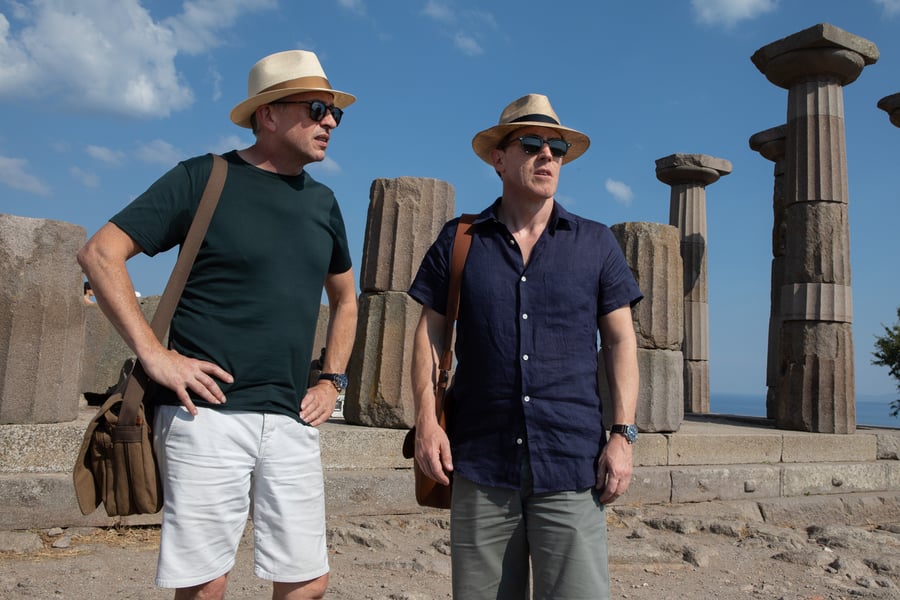“I do think as you get older, it’s inevitable that you repeat yourself,” says Rob Brydon. “This is the fourth time we’ve been on one of these jaunts.” His dining companion Steve Coogan, who’s been digging lustily into a plate of braised lamb, shakes his head. “Originality is overrated. Everything’s derivative.” Just look at The Aenid — it’s “the greatest poem of the Roman Empire, and that was a rip-off.” By the time these two comedians are served dessert, they’re bickering over Coogan’s level of fame regarding a fake eulogy and trading celebrity impersonations. Fourth verse, same as the first. Only the scenery has changed.
Familiarity normally breeds contempt. In this case, the sense that we’ve been here before could not be more welcome. We are fewer than 10 minutes into The Trip to Greece, supposedly the last of the British duo’s movies in which they eat, drink, and make mockery, and you already have everything that’s made the film series so consistently appetizing. There’s a gorgeous view of the Turkish countryside — as with the three previous Trips, Coogan and Brydon are on assignment for The Observer. (They’re retracing the trek homeward in Homer’s The Odyssey.) There is a meal, the first of many, that doubles as Michelin-star food porn. There are arguments about things that are respectively petty and profound, which usually devolve, or possibly evolve, into an impression-off. A heated discussion about Aristotle’s Poetics ends with an imagined encounter between Laurel and Hardy, as in Stan Laurel and Tom Hardy’s Batman villain, Bane.
And there’s the mixture of meta aspects and melancholia that Coogan, Brydon, and director Michael Winterbottom have used as a base line for the series, with the latter emphasized more than usual this time. Whether it’s the original-recipe TV show that’s broken into six half-hour episodes or the scaled-down feature-length version, each Trip entry is essentially a leisurely gentleman’s stroll through a hall of mirrors, with two air-quoted famous people — “Steve Coogan” and “Rob Brydon”— ribbing each other and themselves. Dramatic beats get nestled in between the viral, competitive Michael Caine mimicry and travelogue vignettes. Viewers get just enough hand-wringing over career ups and downs, romantic travails, and family issues to sustain the illusion of real-life stakes. You know these guys are improvising to a degree, and a decade down the line, you’re still jazzed to see them play off each other. The trio have this sleight of hand down to a science.
But from the moment Brydon recites the opening lines of Homer’s epic (“Sing, Goddess, Achille’s rage, black and murderous,” and in Richard Burton’s Welsh burr, no less) over a former military-camp-turned-tourist-site, The Trip to Greece feels a few shades darker than its predecessors. The passage of time hangs heavy over the proceedings, as these two middle-aged celebrities trod down the path of warriors and kings, leaving less of their own footprint behind. What was once home to an empire is now a Mediterranean vacation spot, with plenty of ruins and antiquities perfect for snapshots. You get the sense that, like Tony Soprano, they both feel like they’ve come in at the end.
Coogan, especially, seems deflated by the fact that he isn’t instantly turned into Alexander the Great by setting foot on ancient soil — that, and the fact that Brydon knows more about the origins of the theme to Grease then he does about Greece. A chance encounter with a real-life co-star from another Winterbottom movie, Greed, leaves Coogan feeling like a jerk. The young, pretty hospitality workers are now immune to his charm offensives. Having seven BAFTAs, as the actor reminds his traveling companion at every opportunity, has given him a sense of self-importance. But when the ashes-to-ashes, dust-to-dust settles, what’s it matter? Everything is destined to turn into history one day, including them … if anyone even remembers us in 200 years, Coogan notes. Death has always been a part of these Trips (remember the conversation with the petrified corpse in the Italy installment?). Here, in the form of Bergmanesque dream sequences and phone calls from home, it jostles its way into the narrative more and more.
Sorry, we’re making this sound like the second coming of Shoah. The Trip to Greece shares the same DNA that gave us this, and this, and this. If the shock of the new has worn off slightly, this swan song is as consistently funny as the earlier films. Coogan once again plays the easily ego-bruised blowhard, eager to remind Brydon that he’s recognized as a serious actor (this final film actually calls upon him to flex his dramatic chops, ironically, and he’s wonderful in those scenes as well). Brydon is once again the affable “light entertainer” who delights in puncturing his pal’s pretensions, as well as annoying everyone by compulsively breaking into unsolicited impersonations. Each unhappy famous person is unhappy in their own unique way. The faux Coogan and Brydon’s neuroses and middle-aged malaise happen to complement each other’s character flaws beautifully. No two men do one-upmanship duets better.
By the time we reach the end of the road, you’re happy to have tagged along (now more than ever); it may be over, but we’ll have … well, not Paris, unfortunately, but the Amalfi Coast, and King’s Landing, and dueling Roger Moore impersonations, and a legion of ABBA singalongs. The last act brings both unexpected visitors and bad news, and drops Coogan and Brydon’s slightly exaggerated screen counterparts into similar parting situations as those previous films. The finality of where we leave them, however, feels different. This franchise, if we can call these invaluable piss-takes on fading masculinity and tributes to male friendships a “franchise,” has reached its last destination. Like the non-Greek philosopher says, the journey was what really mattered.
Love Music?
Get your daily dose of everything happening in Australian/New Zealand music and globally.



































